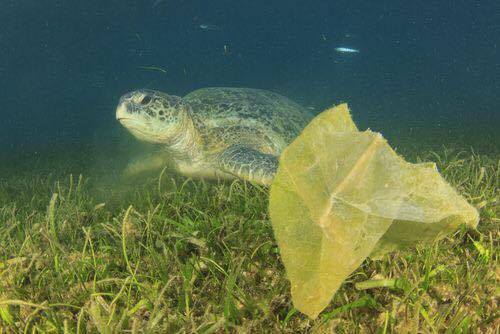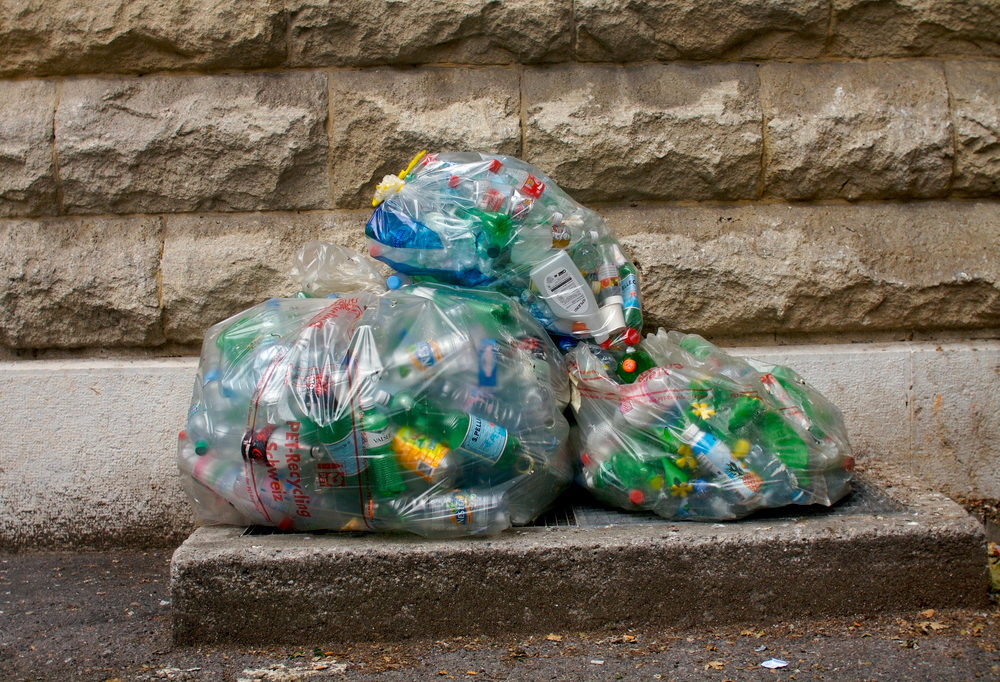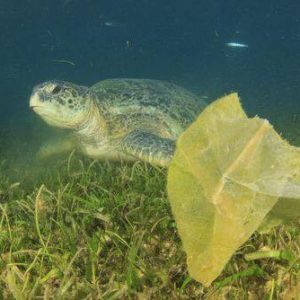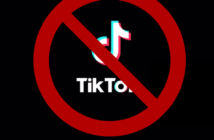- The average American throws away 185 pounds of plastic every year Credit: @flickr Nicolas Nova
- Plastic trash ends up in precious wildlife habitats Credit: @twitter Plastic Soup Foundation
- People are affected from the plastic pollution as well and there is no end in sight Credit: @flickr Lioc Druart
By Niclas Bez
California is the first state in the United States to fully ban plastic bags. In a referendum, called “Proposition67” in Nov, six million California citizen voted “yes” on the plastic bag ban. This referendum is a vote for the environment and everyone that is fighting for it. There has been a lot of tension between lobbyists from the plastic bag industry and the citizen of California over multiple years, as The Huffington Post reported.
It started back in 2007, when San Francisco banned plastic bags, and more and more cities joined them shortly afterwards. In 2014, Governor Jerry Brown signed the Bill 270 that bans single-use plastic grocery bags. However, the American Progressive Bag Alliance led a million dollar campaign against the ban, claiming it would kill thousands of jobs and increase costs for the consumer, reported the Sacramento Bee.
With the win of the referendum, the decision to ban plastic bags in California is now official. The ban will help to eliminate 15 billion pieces of plastic trash every year. Almost half of the population in California that did not have any bans before will have to get used to not having the free one-use plastic bags anymore. The people will have to adjust and bring their own reusable bags or purchase recycled paper bags for a small fee.
“I think the ban on plastic bags in California is a good idea. When you ban plastic bags it can have a really good impact on the earth’s environment. One example would be if a plastic bag finds its way into our ocean it can be consumed by the animals mainly sea turtles who confuse it for a jellyfish,” said Tiffany Gargiulo, who is a senior majoring in Biology.
The biggest winner of the ban is likely to be the environment. Plastic pollution is a huge problem, since a big share is going to end up in wildlife habitats on land or in the oceans, causing harm to animals and humans. According to a report on Ecowatch.com, in the Los Angeles ten metric tons of plastic fragments are carried in the Pacific Ocean every day. Globally, there are billions of pounds of plastic in the oceans that make up forty percent of the of the world’s ocean surfaces, according to a report from EcoWatch.
“Since its mass production began in the 1940s, plastic’s wide range of unique properties has propelled it to an essential status in society. Next year, more than 300 million tons will be produced worldwide. The amount of plastic manufactured in the first ten years of this century will approach the total produced in the entire last century, according to the report, said Jessica Knoblauch, an author for the Environmental Health News.
The ban in California is part of a movement that started in Europe multiple years ago and spread over more and more countries, according to Greenpeace. In parts of Australia, plastic bags have been banned and Tanzania and Singapore have petitions to ban plastic bags as well. The main issue with banning plastic bags is that plastic is so cheap and durable that a big share of the world’s population cannot afford anything else than plastic. In fact, in big parts of Africa, India, and Asia plastic bags get used and then get disposed in the environment, which will eventually end up in the ocean.
“I would like to see a steady decline in use of plastic bags since it is impossible to ban them in one whole day,” Gargiulo continued.
The production of plastic also require eight percent of the world’s oil production for its production, according to EcoWatch. Bioplastics are not a good solution either because they use food source crops, which creates the food prices in poor countries to rise.
Plastic trash is a global problem and banning plastic bags is a step in the right direction, but not a final solution. Banning plastic bags seems as the easiest way because they can be replaced with reusable bags. However, there are so many more kinds of plastic that end up in the environment like plastic bottles, straws, or packaging of groceries and clothes.
The problem starts in the mindset of the consumer. An EcoWatch report states that 50 percent of plastic is only used once and that the average American throws away 185 pounds of plastic every year. More than 500 billion plastic bags are used worldwide and the worst is that plastic takes close to 1000 years to degrade.Also, the plastic trash that ends up in the ocean and other wildlife habitats kills around one million sea birds and 100,000 marine mammals annually. Sea birds, whales, fish and sea turtles have been found with plastic around their body.
“Plastic pollution doesn’t just hurt marine species. It’s also harmful to people. As plastic debris floats in the seawater, it absorbs dangerous pollutants like PCBs, DDT and PAH. These chemicals are highly toxic and have a wide range of chronic effects, including endocrine disruption and cancer-causing mutations,” said the National Center for Biological Diversity.
The government can not only enforce bans and regulations to eliminate or reduce the use of much plastic, but they can also enforce recycling more. Currently, only a very small amount of plastic is recycled, while most of it ends up on landfills or in the environment. European countries, like Germany, have shown that it is possible to put a pawn on plastic bottles, so that the people return them to recycle stations and enforce the use of reusable shopping bags.
The global trend of consumers and movements against plastic is calling consumers to be more aware of what they do to the environment and the wildlife habitat by consuming and throwing away so much plastic.
By Niclas Bez
California is the first state in the United States to fully ban plastic bags. In a referendum, called “Proposition67” in Nov, six million California citizen voted “yes” on the plastic bag ban. This referendum is a vote for the environment and everyone that is fighting for it. There has been a lot of tension between lobbyists from the plastic bag industry and the citizen of California over multiple years, as The Huffington Post reported.
It started back in 2007, when San Francisco banned plastic bags, and more and more cities joined them shortly afterwards. In 2014, Governor Jerry Brown signed the Bill 270 that bans single-use plastic grocery bags. However, the American Progressive Bag Alliance led a million dollar campaign against the ban, claiming it would kill thousands of jobs and increase costs for the consumer, reported the Sacramento Bee.
With the win of the referendum, the decision to ban plastic bags in California is now official. The ban will help to eliminate 15 billion pieces of plastic trash every year. Almost half of the population in California that did not have any bans before will have to get used to not having the free one-use plastic bags anymore. The people will have to adjust and bring their own reusable bags or purchase recycled paper bags for a small fee.
“I think the ban on plastic bags in California is a good idea. When you ban plastic bags it can have a really good impact on the earth’s environment. One example would be if a plastic bag finds its way into our ocean it can be consumed by the animals mainly sea turtles who confuse it for a jellyfish,” said Tiffany Gargiulo, who is a senior majoring in Biology.
The biggest winner of the ban is likely to be the environment. Plastic pollution is a huge problem, since a big share is going to end up in wildlife habitats on land or in the oceans, causing harm to animals and humans. According to a report on Ecowatch.com, in the Los Angeles ten metric tons of plastic fragments are carried in the Pacific Ocean every day. Globally, there are billions of pounds of plastic in the oceans that make up forty percent of the of the world’s ocean surfaces, according to a report from EcoWatch.
“Since its mass production began in the 1940s, plastic’s wide range of unique properties has propelled it to an essential status in society. Next year, more than 300 million tons will be produced worldwide. The amount of plastic manufactured in the first ten years of this century will approach the total produced in the entire last century, according to the report, said Jessica Knoblauch, an author for the Environmental Health News.
The ban in California is part of a movement that started in Europe multiple years ago and spread over more and more countries, according to Greenpeace. In parts of Australia, plastic bags have been banned and Tanzania and Singapore have petitions to ban plastic bags as well. The main issue with banning plastic bags is that plastic is so cheap and durable that a big share of the world’s population cannot afford anything else than plastic. In fact, in big parts of Africa, India, and Asia plastic bags get used and then get disposed in the environment, which will eventually end up in the ocean.
“I would like to see a steady decline in use of plastic bags since it is impossible to ban them in one whole day,” Gargiulo continued.
The production of plastic also require eight percent of the world’s oil production for its production, according to EcoWatch. Bioplastics are not a good solution either because they use food source crops, which creates the food prices in poor countries to rise.
Plastic trash is a global problem and banning plastic bags is a step in the right direction, but not a final solution. Banning plastic bags seems as the easiest way because they can be replaced with reusable bags. However, there are so many more kinds of plastic that end up in the environment like plastic bottles, straws, or packaging of groceries and clothes.
The problem starts in the mindset of the consumer. An EcoWatch report states that 50 percent of plastic is only used once and that the average American throws away 185 pounds of plastic every year. More than 500 billion plastic bags are used worldwide and the worst is that plastic takes close to 1000 years to degrade.Also, the plastic trash that ends up in the ocean and other wildlife habitats kills around one million sea birds and 100,000 marine mammals annually. Sea birds, whales, fish and sea turtles have been found with plastic around their body.
“Plastic pollution doesn’t just hurt marine species. It’s also harmful to people. As plastic debris floats in the seawater, it absorbs dangerous pollutants like PCBs, DDT and PAH. These chemicals are highly toxic and have a wide range of chronic effects, including endocrine disruption and cancer-causing mutations,” said the National Center for Biological Diversity.
The government can not only enforce bans and regulations to eliminate or reduce the use of much plastic, but they can also enforce recycling more. Currently, only a very small amount of plastic is recycled, while most of it ends up on landfills or in the environment. European countries, like Germany, have shown that it is possible to put a pawn on plastic bottles, so that the people return them to recycle stations and enforce the use of reusable shopping bags.
The global trend of consumers and movements against plastic is calling consumers to be more aware of what they do to the environment and the wildlife habitat by consuming and throwing away so much plastic.









2 Comments
There’s definately a lot to learn about this subject. I love all of the points you made.
What’s Taking place i am new to this, I stumbled
upon this I’ve found It positively useful and it has helped
me out loads. I am hoping to contribute & aid other users like
its helped me. Great job.